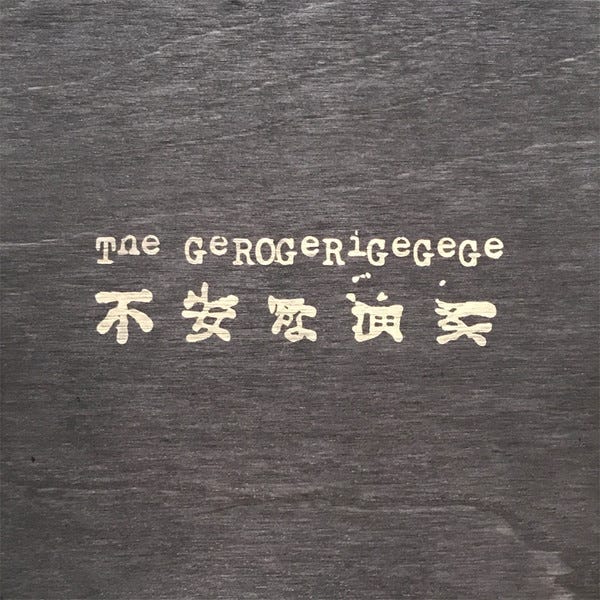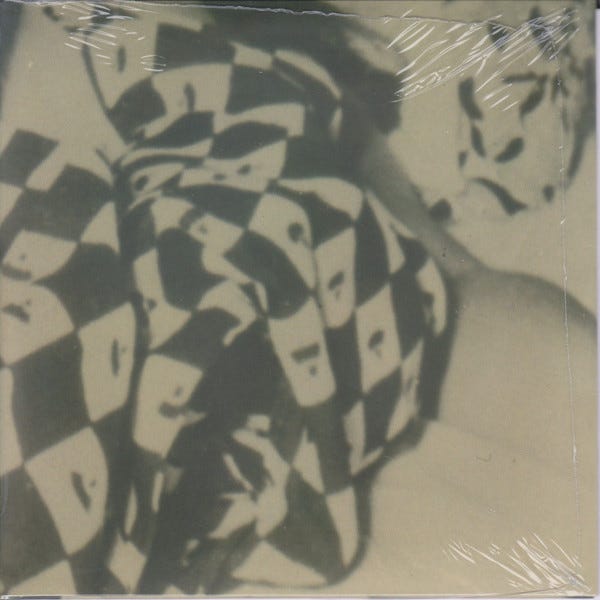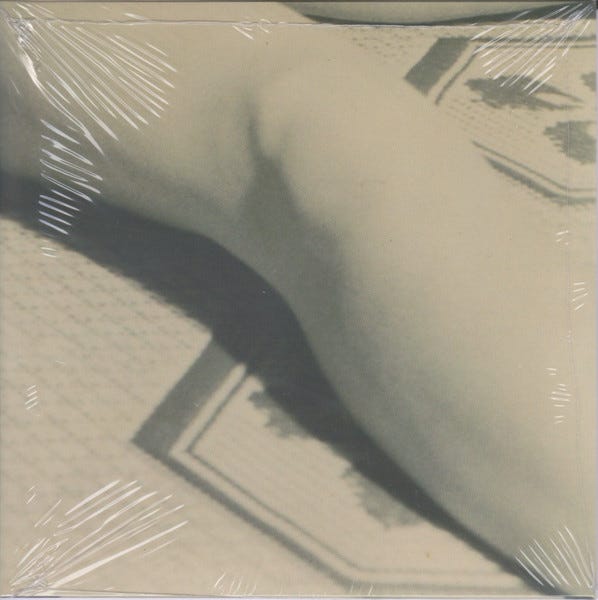A Dead End Record
On Listening to “Anxious Performance” by The Gerogerigegege
Over the past few weeks, in piecemeal fashion, when I had the time and felt the inclination, I’ve been working my way through Anxious Performance, a 10xCD boxset of selected “ero-tape” recordings put out by the Urashima label in 2020. Ero-tapes are, as the name might imply, a type of pornographic audio cassette which was sold in Japan between the 1960s and the 1980s. They purport to be quasi-voyueristic recordings of real sexual encounters in love hotels and other titillating venues, although, given the lack of a visual component, it’s impossible to say for sure that this is actually what we’re hearing. The strongest evidence for their veracity is that the men and women on these recordings do sound more like people actually having sex than they do actors pantomiming the idea of it – the sound quality is uniformly poor – like the recordings were made illicitly, or incidentally; there’s a lot of muffled conversations on these tapes, footsteps passing, cars going by outside, indistinct thumping and squeaking, moans, heavy breathing. There’s no particular sense of erotic narrative or “choreography”, as you usually get from commercial porn; brief bursts of intense rhythmic activity seem to more or less arbitrarily punctuate long, languorous stretches of aimless fooling around. The TV or radio is sometimes on in the background, and sometimes this dominates the recording. It’s hard to say if anyone orgasms.
Anxious Performance is “by” The Gerogerigegege, Juntarō Yamanouchi & co.’s legendary, unclassifiable band-cum-life-work, although there’s no pretense that Juntarō, or any other member of the “band”, was in any way involved in the production of these recordings; their/his artistic intervention (for simplicity, I’m going to be treating “The Gerogerigegege” as synonymous with Juntarō as an individual going forward; I understand this isn’t strictly accurate, but parsing out exactly who is responsible for what across its fragmented discography is both beyond the scope of what I want to talk about here, and probably impossible for someone who doesn’t speak Japanese, if it’s possible at all) is limited entirely to matters of selection and arrangement. Each disc contains (what I presume to be) excerpts from four tapes, most running about fifteen minutes, and a couple outliers running just over twenty. Over 10 CDs, of course, this works out to forty selections, and more than ten hours of material. The selections are numbered 01-40, but these numbers don’t correspond to the order of the discs – Disc 1 starts with “Tape 09”, for example, and Disc 9 ends with “Tape 40”.
It is reasonable to ask why someone would want to listen to something like this – or, more specifically, why I would want to listen to this. Setting aside the tedious and irrelevant question of what does and doesn’t count as “music”, we can say with certainty that these particular tapes were never intended to be listened to as such. The sounds to be heard are uniformly mundane, and not well-recorded. Even if the conversations spackled across these recordings were clearly audible, which they mostly are not, I don’t speak the language. I enjoy the sound of a woman moaning in pleasure as much as the next guy, but the titillation factor here is, in my opinion, pretty minimal; jerking off to this stuff might be an interesting academic exercise, but that’s all it would be, at least for me. Put bluntly, these tapes are cheap masturbation aids that are far, far past their sell-by date. They almost certainly only retain any erotic power for those whose sexuality is hopelessly entangled with the time and place from which they originated – so, people like Juntarō, who certainly didn’t hang on to these tapes (and God knows how many more) all these years for no reason. For the rest of us, they are, in themselves, nothing more or less than abnormally seedy, but ultimately banal, historical artifacts. So, why bother?
I can only answer for myself here, but I’ll try my best. First, for the simple reason that I am interested in things that are boring. I am interested in the idea of looking at something for a long time that does not encourage you to look at it for a long time, and I am equally interested in the idea of listening to something for a long time that does not encourage you to listen to it for a long time. And the scale is important here: if Anxious Performance were, say, only one disc, one hour of recordings, it would be much easier to listen closely to them, certainly, but it would also weight down those particular recordings with an overbearing significance – the marketing copy could read: The Very Best of the Ero-Tapes, Presented Here Together for the First Time. Across ten discs, however, the effect is different; the experience becomes one of texture, of slow accumulation, of constancy and difference. The selections here are clearly not arbitrary, but the sample size is large enough to make it feel pointless to talk about individual moments, or even the particular way in which they’ve been sequenced – there’s simply too much material, and it all sounds too similar. Some recordings are less muffled than others, yes, some performers sound more eager or more desperate than others, yes, but ultimately the impression one comes away with is that these tapes are like people: all different and all the same. And like with people, you can perhaps develop criteria by which to judge the tapes, to say “this one is better than that one”, but it will ultimately be a bit arbitrary, more so than aesthetic judgements already usually are, and more to the point, it won’t be very helpful in understanding them. This is an interesting way for an artwork to be, in my opinion. It is interesting because it generates unusual forms of listening and requires unusual critical operations to get the most out of it – not because it is overly difficult or demanding, but because it is not difficult or demanding at all. These recordings are extremely up-front about what they are and what they want to do. They are about as straightforward as recordings can be. The only thing which is cryptic or ambiguous about them, of course, is that they have become part of “The Gerogerigegege”, rather than sitting forgotten in a box somewhere until they rot away.
This is the second reason to listen to Anxious Performance: because you are interested in The Gerogerigegege. This should probably be the first reason, actually, because I can’t imagine anyone listening to this who wasn’t interested in The Gerogerigegege. I certainly wouldn’t have. It’s only in the context of this larger project that the work becomes legible at all, becomes something more than arbitrary. It is not an entry point. It is not a statement of purpose. It does not believe it needs to explain anything to you, and it is correct, because if you are here, if you are actually listening to this front to back, you already know why you are here. Anxious Performance, it’s important to understand, is a late work. It’s one of a slew of new and archival releases which began to appear with Moenei Hai in 2016, following a silence of more than a decade. The fact of this silence, which was so total that, for years, rumors circulated that Juntarō was not merely in retirement but dead or somehow mentally incapacitated, locked up in a care home, is essential to making sense of Anxious Performance. The cycle of late works of which it is a major facet are disparate in style, in presentation, and in vintage, but they are unified in that they bring to the forefront the autobiographical dimension of The Gerogerigegege, the sense in which it is simultaneously an extension of and a discourse on the fears and obsessions which have, it seems, defined Juntarō’s life. This is something which has always been at the core of the project, but one could be forgiven for not noticing it under the layers of scatological perversity and Dadaist prankishness which characterized the project’s best-known 20th century releases. In this late work, though, like so much late work, there is a new clarity, a sense of urgency and a sense of exhaustion; Anxious Performance, to me, feels like Juntarō trying to lay out for us, as clearly as he can, some essential part of himself, not expecting us to understand but doing it anyway, because he has to, because what else was all this for? If you don’t care about the man, this is probably not very interesting – but I care.
I think that for a long while Juntarō lost faith in the value of trying to “speak” at all. He isn’t young anymore, and he does not seem like someone who has led a happy and fulfilling life. There has always been an essential loneliness to The Gerogerigegege, but in the late work it is completely overpowering. To me, the work suggests a man riven by an essential, irresolvable contradiction: he desires, on the one hand, to expose himself the the world entirely, all the perversions and obsessions and personal failures which consume him – and on the other, he fears being seen by it. He is torn between an impulse to confession and an impulse to secrecy, obfuscation, negation. Thus, as the work becomes more overtly and unmistakably personal in nature, the person of Juntarō himself slowly disappears from it. In new recordings, like the >(decrescendo) cycle, we find him playing softly and simply in outdoor environments dominated by incidental sound; the archival releases, of course, concern history, years gone by, and can be considered something like encounters with past selves. Then, in works like Anxious Performance, which seem to me like the most personal of all, he has reduced himself to nothing more than a curator of readymade material, “speaking” through recordings he had nothing to do with at all. “This is a dead end record,” he says in the liner notes. So is life, probably.
In many of the selections on Anxious Performance, tape degradation has introduced a soft but persistent static crackle to the recording. Sometimes, this crackle sounds like gently falling rain. Eventually, that rain will wash everything away. Eventually, everything will crumble to dust. You can spend your whole life peering in on other people caught up in the midst of life, while you yourself remain outside of it. You can spend your whole life never finding a place where you feel you belong, but continuing to live anyway. There is nothing which cannot be meaningless, and nothing which cannot be meaningful. It is a question only of where you are, and where you have been. In 2022, The Gerogerigegege released another boxset, whose title, Shinjuku ni inochi sabi shimu uta ōshi, translates to something like “Songs for the lonely in Shinjuku”. My understanding is that it’s essentially the same sort of deal as Anxious Performance, except gay. As of this writing, it is the most recent “new” Gero release. Quite possibly it will prove to be the very last – although, of course, I hope not. I intend to listen to it also. Later, though. I’m still young.




